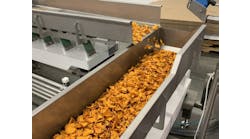We’ve assembled a panel of plant operations experts to answer any question you have on plant-floor issues. To pose a question, go to www.FoodProcessing.com/ClarionKC.
I’ve heard that switching my lubrication program or implementing an oil analysis program can be a preventative maintenance measure; is the upfront cost and investment worth it?
An oil analysis (OA) program can be a great way to take the guess work out of some plant maintenance. If applied properly, an OA can reap numerous benefits, including less down time, controlled maintenance costs and better equipment performance. It’s really a predictive maintenance opportunity — with an OA, you can begin to predict when maintenance is needed.
The first thing to consider is, why do you want to implement a program — what do you want to get out of it? Do you want to overhaul completely your current lubrication process, do you want to look at ways to streamline and reduce costs associated with lubricating equipment, or do you want to determine if your oil is contaminated and possibly harming your machinery? Defining the goal before beginning is critical to defining success and justifying the initial expense.
For example, an OA program can:
- Monitor the condition of oil, including contaminants
- Monitor the condition of the machinery/equipment to improve preventative maintenance schedules and optimize drain intervals
- Develop a baseline of the current oil and equipment condition to measure progress
- Track oil performance
Some other things to consider before starting an OA: check duty cycles, actual and possible failure modes and the environment and operating conditions. Make sure the program is embraced by the plant operations and maintenance teams so they are aware of new procedures, handle them accordingly and are clear on their role within the OA program.
How should I go about defining an oil analysis program for my plant? How extensive does it need to be?
Determine what part of your plant operations would most benefit from having an OA system. Is there a piece of machinery that has required a high level of maintenance? Or, is there a “hot spot” that, if it breaks down, will shut down your entire system? An OA program doesn’t have to start plant-wide; it may make more sense to start with one section of the plant and work out the kinks before adapting the program across the plant.
While you might be tempted to leverage your relationship with your current lubrication supplier to get a free oil analysis program, keep in mind that what you get may not give you what you want. Check with several services to see what is available — and what the real cost will be — before making a decision.
If you want to go for a full overhaul, keep in mind the initial time and financial investment will be much more significant. Depending on your overall plant size, anywhere from 100 to 1,000 oil samples per month will be needed to accurately track the health of your operations.
The most important thing to keep in mind is that for an OA to be a worthwhile investment the timing of the sampling must be well managed. Sample too often and you’ll lose money, and if it’s too sporadic the equipment may be compromised.

